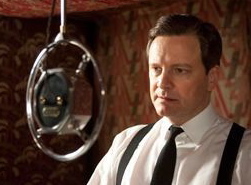The King’s Speech (Tom Hooper, 2010)

“Be not afraid of greatness: some are born great, some achieve greatness and some have greatness thrust upon them.”
[William Shakespeare in Twelfth Night, Act II, Scene V]
In January 1936 King George V of England died, leaving the throne to his son David, who reigned as Edward VIII for 325 days before abdicating in order to marry an American divorcee, Wallis Simpson. His brother, Albert, then became King George VI and reigned until his death in 1952.
Tom Hooper’s splendidly entertaining film The King’s Speech is the story of Albert’s unlikely ascension to the throne and of help he received along the way from an equally unlikely source.
In America we’ve long celebrated the right of an individual to shape his or her own life. It is part of our DNA. In pre-World War II Britain, things could not have been less American, especially for the royal family. The young Albert, it seems, was left-handed. As this was considered inappropriate for a prince, he was forced to use his right. Bertie was also slightly knock-kneed, thus his boyhood years were spent in braces to create a good, royal bearing. Unfortunately all of this shaping also produced a strong stammer that haunted Albert throughout his life, and for a man whose professional purpose is to be a public figure this was, to say the least, awkward.
In The King’s Speech Albert’s search for help with this problem leads him through a frustrating procession of doctors who treat his problem with less-than-effective therapies ranging from marbles–in-the-mouth to smoking. (Albert died in 1952 from lung cancer brought on by smoking.) When his wife Elizabeth (played by Helena Bonham Carter) in disguise seeks the help of yet another therapist, he simply suggests her husband “change jobs,” and when she says “he can’t,” he wants to know why. “What is he, an indentured servant?” Her ironic answer—“Something like that”—captures Albert’s dilemma: he is not free to decide which role his life will play. His only choice is how that role will be played and with war looming there’s a lot riding on his performance.
Enter his redeemer. Lionel Logue (Geoffrey Rush) is the antithesis of Albert (Colin Firth). He’s not only a commoner he’s a (mostly) failed actor who makes his living as a self-styled speech therapist. He’s a man who determinedly lives life his way. He treats speech impediments his own way, too. The King’s Speech is rated R because of a scene in which Lionel encourages Bertie to curse extemporaneously. The result is one of the most delightfully vulgar things I’ve ever seen on film. With Lionel’s help Bertie not only learns how to give a speech, he learns how to serve.
The bell tower here at the University of Texas is engraved with a quote from the gospel according to John: “You shall know the truth and the truth shall make you free.” It’s a goal students at U.T. pursue every day, nota pursuit of knowledge, but of the freedom to define one’s self. In the name of freedom they choose not only their careers and spouses, they can choose to change their sex, their appearance, and one day whether or not to keep their children. For them, freedom is doing what they want. It’s not what Jesus had in mind when he spoke. According to theologian J. I. Packer, Christian freedom is first freedom from: freedom from the power of sin and the tyranny of pleasing ourselves. And as people who have been set free, we’re called to see what freedom is for: to love and serve God and our neighbor. Service is what we were made for, so freedom is found in serving.
Does Bertie live happily ever after? At the risk of spoiling the film, I’ll answer: no more than we do. The hope of the gospel isn’t that if we work hard everything will be all right. Our hope is in what Christ has done and is doing in our midst. But Bertie does discover that necessity isn’t the opposite of freedom.
I recommend The King’s Speech to you: well acted, well scripted, a delightful story. It’s Oscar worthy.
Copyright © 2011 R. Greg Grooms

